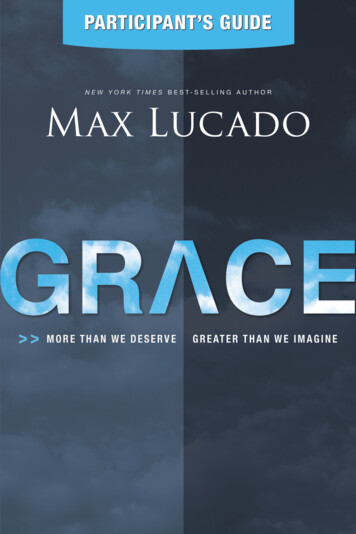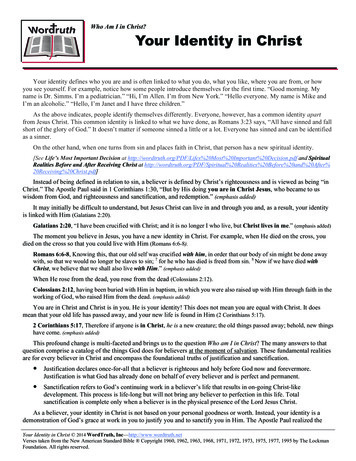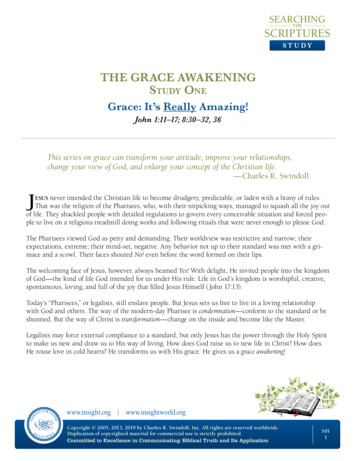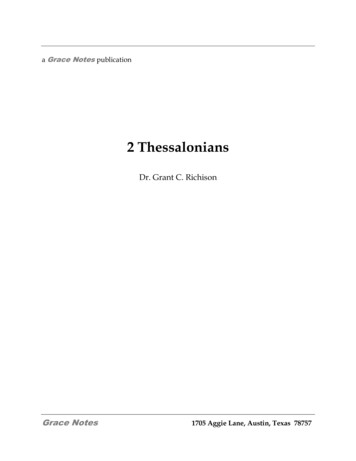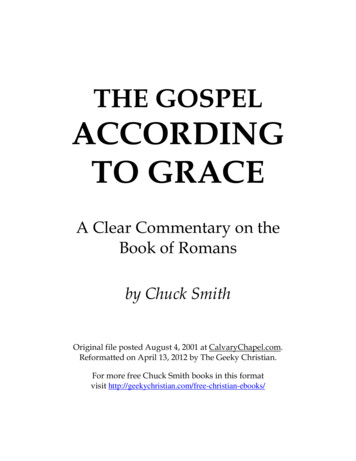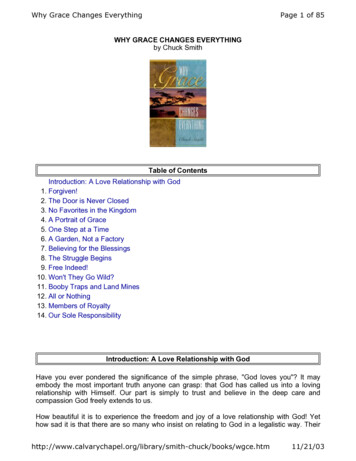
Transcription
StartRightly DividingHow to start studyingwith the right heartfrom the right Biblerightly divided.
STARTRIGHTLY DIVIDINGHow to start studyingwith the right heartfrom the right Biblerightly divided.Formatted for PDFJustin Curtis JohnsonCompiled by Jeremey Johnson2015
Copyright 2015Ambassadors PublishingAll rights reserved.This book contains material originally publishedonline at www.graceambassadors.com.Scripture quotations are from the King James Bibleas God’s pure words preserved in English.ISBN-13 978-1-942548-00-3ISBN-10 1-942548-00-1P.O. Box 161Swayzee, Indiana 46986www.ambassadorspublishing.com
To my brother, Jeremey, who compiled this book,and whose initiative from the beginninghelped me start rightly dividing.
ABOUT THIS BOOKThis book is a collection of writings by Justin Johnson,preacher at Grace Ambassadors Bible Fellowship inSwayzee, Indiana. The writings were originally publishedat GraceAmbassadors.com. Website subscribers receivedthese weekly Bible study tips and lessons on rightly dividingthe word of truth via email updates. Original writings areseparated by their own title or the graphic below, in the caseof longer articles. They are compiled here as a guide forlearning how to study the Bible the way God intended.
CONTENTSPublisher’s Preface.Introduction .Part I:Part II:Part III:Part IV:ixxiGetting Started1. Bible Belief.2. Helpful Study Tools .3. You Can Do It .11019Understanding Right Division254. Approaching Scriptures .5. Finding Instructions.6. The Importance of Right Division .273242Distinguishing Dispensations537. Dispensations in the Bible .8. Rightly Dividing the Light.9. Keeping a Secret in Bible Study .556780Doing the Work9510. How to Study .11. Bible Study Tips .97109vii
THE PUBLISHER’S PREFACE:THE PREACHING OF THE CROSSThe Bible says the preaching of the cross is the power ofGod, the wisdom of God, and the glory of God untosalvation (1 Cor 1:18, 24; Rom 1:16; Phil 3:7-11).By the cross, enemies are reconciled to God and havepeace with him (Col 1:20; Rom 5:1; 2 Cor 5:19). The bloodshed there secures forgiveness and redemption (Eph 1:7). Thepreaching of the cross gives eternal life to all who trust itsresurrection power. By the cross, God takes ungodly sinnersand freely justifies them through faith (Rom 3:24, 4:5, 5:1).How can this be right? How can God give salvation toungodly men by mere faith? Should not God merit salvationby good works? Would not God receive more glory byworks? Abundant good works cannot justify a single sin. Weare all sinners. The wages of sin is death (Rom 3:23, 6:23).A million good works amount to nothing when one sinresults in death.There is no glory in a sinner trying to impress a righteousGod with his good works. It is futile. Religion does notimpress God, and flattery is fake. God owes us nothing. Sinand boasting will cost you everything (1 Cor 1:29). Man cannotearn salvation. God can only give salvation. You have nothingwith which to pay. He must provide salvation freely.This is what God provided in Jesus, the one and onlyperfect Christ, through his blood, death, burial, andresurrection. Christ’s blood is the payment, his resurrectionis the receipt, and the preaching of the cross is the delivery.All that remains is for us to believe!ix
Christ did everything necessary to save your soul. TheLord Jesus Christ was made sin for us, abolished deathwith his resurrection power, and made immortality andrighteousness an opportunity to all through him. Thissufficient and finished work provides salvation freely to alland upon all that believe. Trust God’s righteousness inChrist, not your own, and you will be saved (Rom 3:20-26).The preaching of the cross is the power of God untosalvation. Talk of salvation is vain without it. Give glory toGod for doing the needed work. Glory in the cross!“[Christ Jesus] Whom God hath set forth to be apropitiation through faith in his blood, to declare hisrighteousness for the remission of sins that are past,through the forbearance of God; To declare, I say, at thistime his righteousness: that he might be just, and thejustifier of him which believeth in Jesus.”– Romans 3:25-26“But to him that worketh not, but believeth on himthat justifieth the ungodly, his faith is counted forrighteousness.”– Romans 4:5"I declare unto you the gospel. by which also ye aresaved. that Christ died for our sins according to thescriptures; and that he was buried, and that he rose againthe third day according to the scriptures "- 1 Corinthians 15:1-4x
INTRODUCTIONThe Bible is a book that needs to be studied. This is noless true knowing that most Christians barely read it.Reading gives familiarity, but study supplies understanding.The apostle Paul said, “Study to shew thyself approved untoGod, a workman that needeth not to be ashamed ” (2 Tim2:15). Shamefully, there are few that do the work and fewerstill that understand what the Bible says. Without a doubt,the Bible needs to be studied, but how?After visiting our church and hearing the importance ofpersonal Bible study, people frequently ask, “How do Istart?” The prospect of studying 31,102 verses and 788,280words in the Bible can be daunting. The task is like beingcharged with eating an elephant. How does one eat an entireelephant? The hackneyed response is “one bite at a time.”Take the large task and divide it.The Bible is naturally divided into 66 books, but thethought of reading so many books does not make it any easier.Publishers divide the Bible into the Old and New Testaments,but this has unintentionally caused more harm than help.With genealogies, ancient history, cryptic prophecies, andJewish traditions how do we divide the Bible to understandit clearly? More importantly, and to cut to the chase, wheredo we find the part of the Bible that applies to us today?How do we rightly divide the word of truth as Paul instructsin 2 Timothy 2:15?The right place to start is by preparing our hearts andgetting the right tools. Before study happens there needs tobe a right heart toward the right Bible. Only then, can westart rightly dividing the word of truth and ultimately profitfrom finally understanding the Bible. Let’s get started!xi
Part IGETTING STARTED“Let God be true, but every man a liar ”-Romans 3:4
CHAPTER 1BIBLE BELIEFBefore you study the Bible, you need to make a choice.You must choose whether your mind has flaws that needcorrected or if God’s word has flaws that need corrected.People who choose that the Bible has flaws will acceptonly those parts that align with their way of thinking, servetheir interests, or speak positively about their way of life.Bible believers admit that the Bible is perfect whereas theyare not. This results in a change of mind that aligns withBiblical truth.If you want to grow in the knowledge of the truth, youmust start by eliminating the idea that your Bible has flawsthat need corrected. You are the one that needs corrected,and that by God’s word. If you cannot make this choice thenyou have no place studying the Bible. The Bible will be aclosed book to you.Bible believers submit to God’s book; correctors of theBible require God’s words submit to them. Before you openthe book, and the book opens to you, you must know yourplace. Choose to let God be true and his word perfect.1
Getting StartedSTARTING WITH FAITHMany people have spent years poring over ancientdocuments, texts, and languages searching for indisputableevidence that the Bible is what it says it is: the word of God.After collecting piles of data and evidence, the same decisionfaces them. Are these God’s words?What is missing is faith in God to preserve his words.Without faith it is all meaningless (Heb 11:6). Before youbegin to profit from studying the Bible, manuscript evidence,translation, or apologetics, you must first believe that Godhas inspired and preserved his words. Otherwise you arewasting time looking for something you do not believeexists. At least give God the benefit of the doubt, but thegreater benefit is in receiving the Bible as the word of God.Stop doubting the Bible to be true. Place your faith inGod and determine to study your Bible as the words of God.Do you not see that God authored this book? Read its pages.Do you not find divine truth in the words of Jesus? Do younot believe the clear gospel that saves today?1Faith in God’s word is the beginning of intelligent Biblestudy. There is no object of faith more certain than God andhis words. Without faith it is impossible to please God.Without faith you will be tortured by doubt your whole life,not because of a lack of evidences but simply because youdeny them. We must have faith in the inspiration of God’sword to the written page.Yet, even inspiration falls short without the usefulpreservation of those words. Preservation is how divineinspiration reaches you in the here and now. God’s word1See the foreword to this book for the gospel preaching of the cross.2
Chapter 1: Bible Beliefmust be accessible to serve its purpose. A great truth thatremains a mystery is not usable. It must be revealed. It mustbe available. It must be preserved. God has spoken plainlyand directly to us through his written word. All we have todo is trust the book God authored. Trust it as havingsupernatural origin, soaked in divine Truth, and readilyavailable to discover the wisdom of God. Decide now to putyour faith in God, trust your Bible and cast away all doubt.Only this will allow you to pursue the truth with confidence.GOD’S PRESERVED WORDSI believe every word in the King James Bible on mydesk. Some may find that offensive, but I believe it is moreoffensive to God to believe any less.There is no good reason to doubt that God couldpreserve his inspired words perfectly and without error. Thewinds and the seas obey him. He has measured the waters inthe hollow of his hand. He declares the end from thebeginning, and before the world began he knew Christwould die for my sins. He put on humanity, defeated death,and will reign over the universe for eternity. His ways areperfect, and his thoughts pure. His faithfulness never ceases,and his wisdom is infinite.It is not a hard conclusion to make that if God inspiredwords for the salvation of humanity that he would preservethem for those he desired to save. Sadly, there are many whofind it hard to believe every word in the Bible. Others willargue at length attempting to prove the impossibility ofGod’s preservation through supposed mistakes and errors.There should not need to be an argument on this pointaccording to Romans 3:3-4; nevertheless, their protestations3
Getting Startedare found severely wanting: the errors simply do not exist.2If they have a problem with God’s words, then there will beplenty of time to talk to him about it in heaven. That is, ifthey are able to trust his words enough to get there.Christians ought to be preaching and teaching belief inGod and His words rather than ministering doubt. Whatgood comes from standing in doubt of the Bible when itswords of life and peace work only in them that believe?3There is a good reason that I believe every word in myKing James Bible. The reason is that my faith in God dependsupon it.4“ faith cometh by hearing, and hearing by the word ofGod.”– Romans 10:17I cannot know God without believing the Bible in myhands. I cannot be throughly furnished to do every goodwork without believing every word of the Bible on my lap.“All scripture is given by inspiration of God, and isprofitable that the man of God may be perfect,throughly furnished unto all good works.”– 2 Timothy 3:16-172Commonly the supposed errors are instances of polysemy, spelling,archaic words, translation preference, and contextual contradictions, allof which are not true errors or mistakes.31 Thess 2:13; 1 Cor 2:144Faith is born from the word of God being heard. In its beginning, faithdoes not require hearing every word of the Bible. Faith is conceived withonly a few words, but if the man of God is to be perfect, then “allscripture” must be available and perfect (2 Tim 3:16).4
Chapter 1: Bible BeliefMost importantly, it is an offense to my Lord if Icontinue in unbelief. It is not a matter of probability thatGod’s words are preserved. Neither is it a matter of man’scapability. It is a matter of God’s responsibility.“And being fully persuaded that, what he had promised,he was able also to perform.”– Romans 4:21PRESERVATION: THE BIBLE ISSUESometimes people confess that they still do notunderstand the “Bible issue.” They mean Bible translations;which one is the right one? The pivotal doctrine on this issueis not inspiration but preservation.Bible conservatives say God’s word was inspiredwithout error in the originals. We do not have the originalsany more, and so the original inerrancy is lost. Bible liberalssay God’s word was never inspired without error in theoriginals, and we still do not have an inerrant Bible.Bible believers know that the issue in Bible translation isnot inspiration, but preservation. Without preservation thereis no such thing as an inerrant Bible on any bookshelfanywhere. Who cares if there was once an inerrant Bible lostsometime in the past? If it is impossible to have one today, itis impossible to know what it said. Has God preserved hiswords throughout history and languages, or not? If he has,then we should be looking for the right Bible that is accurateand inerrant in recent history. If he has not, then we cannever be sure the Bible is completely without error until wefind indefinitely more yet-to-be-discovered evidence.Preservationists look for a text that has existedthroughout history. Those with a weak view of preservation5
Getting Startedare inclined to believe that it has been lost and so give moreweight to rare, obscure, and recent discoveries. I believe Godinspired the scripture according to 2 Timothy 3:16 andperfectly preserved it to accomplish 2 Timothy 3:17 in us thatbelieve. Once you understand preservation, there is reallyonly one historic text that is accurate and inerrant.GOD’S WORDS TRANSLATEDIn Genesis 11:7, God confounds the language ofhumanity. From that point on, men who thought the samethoughts, felt the same feelings, and experienced the sameworld used different words to speak.As men began to learn other languages, they couldtranslate the words of one language into the words ofanother. We have been doing this for millennia. God did itsupernaturally in men in Acts 2:6.In the book of Exodus, Moses spoke Egyptian to thePharaoh, but every written record discovered contains atranslation into another language such as Hebrew. Mosestranslated spoken Egyptian into written Hebrew, and nowwe have it today printed in English as “Let my people go”(Exo 5:1). Nothing was lost in translation.During his defense in Jerusalem, Paul spoke in theHebrew tongue to his kinsmen while Romans ignorant ofHebrew stood by (Acts 22:1-2). Paul’s spoken Hebrewwords were inspired as translated Greek and thentranslated today into English. We have the Hebrew wordsPaul spoke today only because they were first translatedinto Greek. It is possible to preserve words through languages.If it is possible to preserve the words of mere men, howmuch more the pure words of God.6
Chapter 1: Bible BeliefThe doctrine of preservation says that God preserves hiswords through languages. The Bible gives testimony to thisin many places. You can trust the translated words in yourBible to be God’s words. The original writers did.EVERY MAN A LIARHow far are you willing to go to learn the truth? Wouldyou continue if it meant learning that you are wrong? If youcan do this, you are on your way.What if learning the truth meant that your friends werewrong? We all like to think we know a little more than ourfriends do. This should not be too hard.What if discovering the truth meant that what waspopular and celebrity was wrong? It is possible. After all,wise men say, “What is popular is not always right.” Wehave already established that the average Joe and his friendscan be ignorant.What if accepting the truth meant that learned scholarsand doctors were also wrong? In a world where the primarytool of truth is reason, this may be more difficult to believe.However, we also know that scholars do not agree oneverything. Perhaps there is room for error after all. Could itbe that entire schools are wrong about what is true? Entiredenominations? Entire countries?What if knowing the truth meant that most everyhistorically significant man, scholar, teacher, or philosopherfor the past two thousand years was wrong? Would you stillaccept it? Would you still want to know it, knowing youwould be alone?7
Getting StartedPaul writes, “Let God be true, but every man a liar”(Romans 3:4). Apparently, if every man that ever lived waswrong, God would still be true.Human reason can be fallacious, and experience can bedeceiving, but God and his revelation are never wrong. He isnot a man that he should lie and is worthy of your trust.It would be naive to think that any church, country,preacher, or tradition has the market on truth. When we arewilling to believe God before tradition or training then weare one step closer to gaining what is more valuable thanboth: the truth.Thank God that not every man in history has beenwrong on everything. Where men were right, God was rightfirst, and where men were wrong, God was still right.Ignorance is curable by the truth of the Bible, but it requiresletting God be true, even if it means everyone else is wrong.BELIEVE THE BIBLE, EVEN WHEN IT IS HARDWhile studying your Bible, you will find things that arehard to believe. The world doubts the accuracy of these partsof the Bible and offers excuses for God. By world, I mean the“Christian” world. You may already know of some things inthe Bible that are not widely believed by the majority ofChristians.This chapter serves to encourage you to make up yourmind to trust God’s word as your final authority. There willbe times when you are forced to choose between the Bibleand competing authorities. On the one hand the Bible isright, and on the other hand academic authorities, Christiancelebrities, and religious traditions are right. Settle it in yourmind now what is your final authority.8
Chapter 1: Bible BeliefIn order to be the pillar and the ground of the truth, youwill need a true Bible. Choose now to trust your Bible asGod’s word completely. It will help your Bible studytremendously. The first line of defense against Bibleconfusion is to trust God’s word to be without mistake. Letmen make the mistakes.Let God be true.9
CHAPTER 2HELPFUL STUDY TOOLSChristian publishers provide a surplus of products tohelp with Bible study. Inexperienced Bible students caneasily waste time and money buying unnecessary tools thatslow down or hinder personal Bible study. This chapter willcut through the commercial confusion for those looking forthe tools to get started in personal Bible study.This list is the result of many people asking me what Iuse in study for sermon preparation. Though I am not anexpert on every resource, these simple trusted tools workwhen used the right way. There are many tools in my officethat are rarely used, or not worth the money, but the itemsbelow are used every time I study:1. Bible2. Concordance3. Dictionary4. Notepad5. Software (optional)The list may seem simple at first, but it is the place tostart and will serve you well the rest of your life.10
Chapter 2: Helpful Study ToolsTOOL #1: BIBLEIf you can afford no other book, spend your money on agood Bible. The Bible instructs us to study to show ourselvesapproved unto God, and that scripture is profitable forfurnishing men of God to be unashamed workmen (2 Tim2:15; 2 Tim 3:16). It is important, then, which Bible you use asthere are many different options. I believe every word of theKing James Bible on my desk, and would encourage you toas well. Depending on which desk I use, the Bible on mydesk is one of the following:Church – KJV mid-size large print 215 series1Hendrickson – KJV large print wide margin2Cambridge – KJV Concord wide margin3My Bibles are published with no notes, no references, nored letters (unless I put them there), and I like it that way.When I pick up the Bible, it is only God’s words withoutaffectation.A NOTE ON STUDY BIBLESStudy Bibles include commentary alongside the Bibletext. They are not essential for personal Bible study. I havestudy Bibles but do not use them as my primary Bible. Theyare regarded the same as commentaries in my library as I1The regular text is the Cambridge text. Their Bibles labeled “Classic” isthe Oxford text. (www.localchurchbiblepublishers.com)2This Bible has some capitalization problems that separate it from theCambridge edition text. (http://www.hendrickson.com/)3This Bible has print smaller than the other two on the list, which issmaller than I like. (http://www.cambridge.org/bibles).11
find the notes too distracting when reading the Bible. Theonly reason I have them is to get the unique perspective ofthe author from his notes, but stealing someone else’s notesis not personal Bible study. Not to mention I do not feelcomfortable carrying around someone else’s thoughts andcalling it my Bible.If I was granted a wish by the publishing wizards ofstudy Bibles, they would publish the notes separately topreserve the integrity of the scripture, save me money, andsave my time flipping pages.TOOL #2: EXHAUSTIVE CONCORDANCEThe most important tool in personal Bible study is aconcordance. It is second only to your Bible. To get the mostprofit from it, your concordance must be exhaustive (itcontains every word and every location of each word). I usethe search program in my Bible software for this function,but I also have the only print concordance you will everneed: Strong’s Exhaustive Concordance by James Strong.4A concordance’s strength is in making connections withother passages of the Bible. There are also various books andBibles that give cross-references in attempt to make similarconnections. All cross-references are interpretive and deservedue caution when provided from a third party. However, thebest of these books is The Treasury of Scriptural Knowledge.54Concordances are specific to the Bible translation, so make sure you getthe old Strong’s which is only for the KJV. There are newer knockoffscalled Strong’s but are for other translations. Also, beware of the newerringers claiming to be stronger and more complete. Exhaustive is ascomplete as you can get. Mine is published by Hendrickson publishers.5TSK (Treasury of Scriptural Knowledge) is available for free online, andin print by Hendrickson Publishers P.O Box 3473, Peabody, MA 0196112
Chapter 2: Helpful Study ToolsTOOL #3: DICTIONARYThe Bible is its own best dictionary. With a Bible and aconcordance you can create definitions better than mostdictionaries and more descriptive of their Bible usage.Dictionaries of English can assist in defining some of thelesser used words in the Bible. An older dictionary is betteronly because it gives you a meaning closer to when the Biblewas first published.6If you cannot purchase the 1828 Webster’s dictionary,there are free versions of many dictionaries online along withWebster’s multiple editions.Archaic Words in the Authorized Version by LaurenceVance is also helpful at defining words that have changedmeaning in popular usage.7A NOTE ON BIBLE DICTIONARIESA Bible dictionary can help you with describing people,places, and things from the Bible with information that maynot be found in the Bible. They are often equivalent to Biblenotes and book prefaces in some editions of the Bible. Theyare treated as commentaries in my library since the content isnot inspired and subject to change as new research is done.6The King James Bible was translated in 1611, but has had severaleditions. The most common standards are the Oxford from Blayney’s1769 edition and the Cambridge printing circa 1900. English dictionarieswere not printed until after the King James Bible.7Vance Publications, P.O. Box 780671, Orlando, FL 32879[www.vancepublications.com]13
TOOL #4: NOTEPAD/JOURNALYou cannot study the Bible without taking notes andwriting down your thoughts. Invest in some notepads, blankjournals, and comfortable pens or pencils. Do not be cautiouswith your writing at first. Write down your thoughts aboutthe Bible and any verse references that come to mind. This iswhere personal Bible study happens, and it is different thanhijacking someone else’s meditations.Computers may be reducing the need for paper, butpaper is still very useful and less distracting than a computer.There are papers all over my computer desk with drawings,arrows, and charts drawn on them from my Bible study.Draw out your ideas and let your eyes help your brain makeconnections and outlines. There is still no easier way to dothis than with paper and pen.TOOL #5: BIBLE SOFTWARE (OPTIONAL)Software can contain all of the tools listed above in oneplace. You can start studying the Bible with one click. Thesearch capabilities in my software replace my printedconcordance on most occasions. Software has the ability tomake notes and record my cross-references. This replaces mynotepads, pencils, and journals (though not completely).There are many pages of study notes on my computer withbackups in case of disaster. I use Bible software extensivelyin my personal Bible study out of preference, but the samestudy results can be achieved without the use of software.Free and inexpensive study software such as TheWord,eSword, or SwordSearcher possess all that you will ever need14
Chapter 2: Helpful Study Toolsfrom Bible software.8 Free software is open on my computerevery day customized with a King James Bible, searchfunction, dictionary, and notes readily available.Expensive software like Logos and BibleWorks bringadditional features useful for studying other languages, butstudy of other languages is not Bible study. They areunnecessary for personal Bible believing study in English.The most profitable features are also found in the cheaperalternatives. Save your money.A NOTE ON COMMENTARIES & SOFTWARECommentaries are the product of someone else’s Biblestudy. Since many people never start studying the Bible, theonly Bible they hear is from preaching, teaching, Christianbooks, and commentaries. These resources are very helpfulfor Christians who think that facing the Bible alone isoverwhelming. When the best commentaries were popular,Biblical virtues abounded. This type of literature can beextremely helpful to teach and encourage when thedoctrine is right, but when the doctrine is wrong extensivedamage can be done, especially if it is a substitute forpersonal Bible study.This is why study of commentaries and Christian booksshould not be confused with personal Bible study. Justbecause you listen to commentary and read Christian booksdoes not mean you know the Bible. There are importantlessons that can only be learned by personally digging intoGod’s word and thinking about it. Commentary study is notyour Bible study.8The Word [www.theword.net]; eSword [www.e-sword.net];SwordSearcher [www.swordsearcher.com].15
Teachers never have enough time to expound everythingthey learned in preparation and would admit that they learnmore in preparation than is ever presented. Just because yourteacher knows and teaches something does not mean youknow it just as well. Study it on your own to teach yourself.Commentaries are profitable, but only when studyingsomeone else’s perspective on the Bible. Use with discretiononly after you have studied the Bible, understanding thecommentary’s doctrinal bias, and knowing that what you arereading is not the infallible word of God.EXPENSIVE LIBRARIES AND SOFTWARESometimes people ask me about spending lots of moneyon expensive Bible software and libraries. My answer is, “Itry to avoid it.” Not because I do not want to invest in goodtools, but because I spot a racket when I see one. Many goodclassic books worth knowing well are freely available online.The most expensive books (typically written by seminaryprofessors) often do not contain the gems it costs to purchasethem. I have seen it with my own tired eyes.Better than owning many books and knowing none ofthem very well, own fewer books and master their content.Better to read the books you own instead of owning morebooks than you can read. Better to pay less for great booksthan to pay more for the newest books.Read your books. Study the good ones. Start with theBible. You do not need thousands of books or books worth athousand dollars to grow in God’s word. You should be16
Chapter 2: Helpful Study Toolswilling to put your money where your mouth is and invest inproper tools, but Christian literature is one place where ahigher price does not always indicate higher quality. Beware.COMMENTARIES ARE BIASEDCommentaries are good for seeing what other greatthinkers thought about the scripture. However, there is awarning: they are all biased. The bias is a product of theirdoctrinal orientation. Writing your own commentary willhave your own bias. Identify their bias before you start toread. Who wrote the commentary? With what denominationor church were they joined? What did they believe about thegospel?Use a commentary only after you have already studiedthe passage from the Bible and have come to your ownconclusion – even if it is a list of different conclusions.Sometimes commentaries can give you an idea of how far offyou are. Other times you will realize the writer of thecommentary had just as much trouble as you.Commentaries are useful, but they are
these weekly Bible study tips and lessons on rightly dividing the word of truth via email updates. Original writings are separated by their own title or the graphic below, in the case of longer articles. They are com
